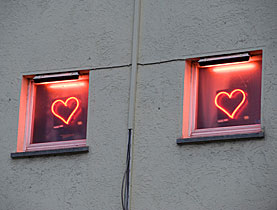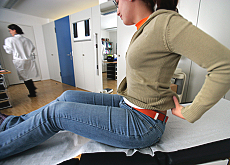Careless boys pose new sex risk

A study of Swiss teenagers' sexual habits has found worrying behaviour among young boys who are sexually active but know little about contraception.
Researchers say the findings show sex education should be given to children earlier, both at home and at school.
The team from the Centre for Development and Personality Psychology at Basel University studied a 2008 online survey of 1,480 people aged ten-20 from German-speaking Switzerland.
While the results showed a stabilisation of the age at which teenagers start having sex and increased contraception use since the 1990s, it also found that more 12- to 14-year-olds were having sex.
“The result that shocked us a bit concerned young boys who display apparently risky behaviour,” Nancy Bodmer, who headed the research, told swissinfo.
“They have more of a tendency not to protect themselves. They do not have a very developed sexual knowledge. They do not understand the consequences of what they are doing and leave the young girls to take care of the consequences.”
She said boys were not interested in contraception and did not display the maturity needed.
The study was carried out on behalf of the government commission for child and youth affairs. It is believed to be the first officially commissioned survey since the 1990s.
Range of experience
Forty-three questions were put to the respondents, of whom two-thirds were girls and 61 per cent were aged 15-18.
Two-thirds of 17-year-olds had already had their first sexual experience. A small proportion, six per cent, said they had been sexually active from the age of 12-14. Sixteen per cent had absolutely no sexual experience.
Around 44 per cent were well informed about contraception, while seven per cent knew little about it.
Two-thirds of young people said they lost their virginity while in a committed relationship.
Around 85 per cent said they had used contraception during their first sexual encounter, while most of those who didn’t said it was because it happened too fast, they did not have contraceptives to hand or were under the influence of alcohol or drugs.
Early prevention
When compared with teenagers in other countries, Swiss youths on average appear to have sexual experiences a little later – 40 per cent are aged 17 – and have a better attitude to contraception, Bodmer said.
Bodmer, who also serves on the commission for child and youth affairs, said she believed information campaigns on issues such as Aids had helped raise awareness about contraception, but more needed to be done to educate young people earlier about sex.
“The results of this study suggest that early prevention makes sense,” she said.
“As young boys in particular show risky behaviour, I think it is very important to familiarise young people with sexual education, which should be taught as early as possible in schools.”
Half of the respondents said they learnt about sex at school, with girls also hearing about it from their mothers and friends. Most boys said they did not learn about sex from their parents.
Parental guidance
Parents, and fathers especially, need to be encouraged to take responsibility for educating their children, she urged.
“There are people who fear that the more we educate children [about sex], the more sexual encounters will take place early. But according to studies in the United States and Europe, children who are informed do not have sexual encounters early. So there is not a negative consequence.”
The findings of the survey were presented at a conference on sexual behaviour in teenagers in Biel on Thursday and will form part of a report by the commission, to be prepared and distributed next year.
“It is important to always be well orientated towards the youth, to know what their experiences are, to know if they want to use contraception and where they stand,” said Bodmer.
“We hope of course that this report will have an effect.”
swissinfo, Jessica Dacey
The legal age of consent is 16 in Switzerland, however, sexual relationships are permitted before the age of 16 as long as the age difference between the two people is less than three years.
The study, Sexuality of Young People, found that Swiss teenagers on average lose their virginity aged 17. It is slightly higher than other countries such as Germany where the average age is 16.
School is the first place where young people learn about sex (27% of girls and 39% of boys). Another 23% of girls learn about it from their mothers, 16% of boys heard about it from “no one” in particular. Friends are another major source of information, with 11% of girls learning about sex this way and 13% of boys.
Girls and boys aged 15-18 had an equal amount of sexual experience.

In compliance with the JTI standards
More: SWI swissinfo.ch certified by the Journalism Trust Initiative




You can find an overview of ongoing debates with our journalists here. Please join us!
If you want to start a conversation about a topic raised in this article or want to report factual errors, email us at english@swissinfo.ch.